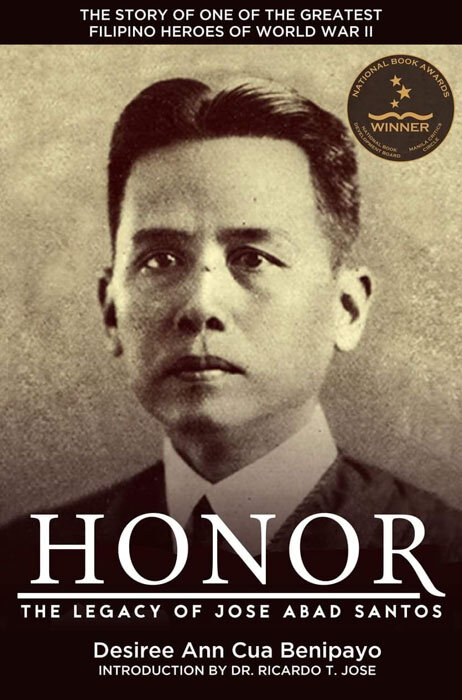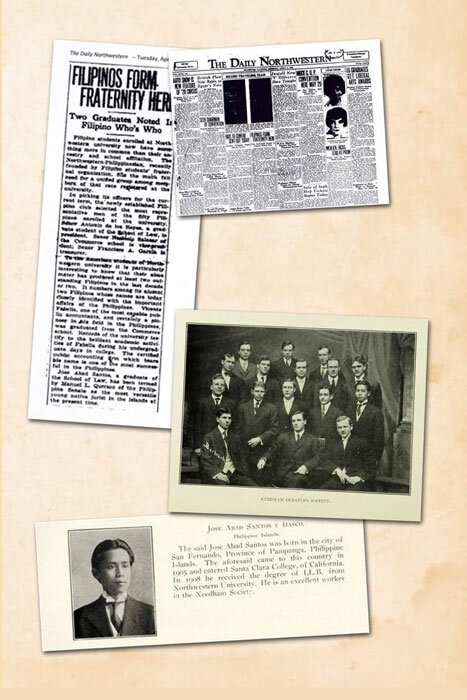Jose Abad Santos: Hero And Front-liner
/Book Review: “Honor: The Legacy of Jose Abad Santos,” by Desiree Ann Cua Benipayo (Philippine World War II Memorial Foundation, Quezon City, 2018)
Chief Justice Jose Abad Santos, as pictured on the 2019 National Book Awardee for Non-fiction prose
The last biography on Jose Abad Santos authored by Ramon Aquino came out in 1985. In 2018, a new biography, written by Desiree Ann Cua-Benipayo, has come out on the heels of an Indie movie, “The Making of a Hero,” which recalls the inspiring story of Abad Santos’ life and martyrdom at the hands of the Japanese. Though these are just tentative steps, they may yet serve to remind us of the heroism and true patriotism of our forebears, in a straight line dating from the Philippine Revolution of 1898.
In the Spanish era, Jose’s father, Don Vicente Abad Santos, a prosperous landowner of San Fernando, Pampanga, supported the Philippine Revolution and was eventually punished by the Spanish authorities -- he would pay with his life. He had a large brood of 10, who in American times would carry on his tradition of love of country, activism, and devotion to learning. Notably, the eldest Pedro—who served as councilor, representative, and member of the 1922 Philippine Independence Mission to the US led by Manuel Quezon—would found the Socialist Party of the Philippines in 1929. Both he and his brother, Quirino, would remain active in the resistance to the Japanese, for which they would be tortured. The family itself, including a supportive mother, Dona Toribia Teopaco, was the setting that explains Jose Abad Santos, heroism and love of country, which led to his death at enemy hands in 1945.
When he departed for the United States in exile, President Manuel L. Quezon had designated Chief Justice Abad Santos (also a three-time Secretary of Justice) as the highest official to represent the Commonwealth Government. Many prominent Commonwealth officials, including Claro M. Recto, Rafael Alunan, and Benigno Aquino Sr., capitulated to the Japanese invaders by taking positions in the puppet republic, but Jose Abad Santos took his assignment from Quezon seriously.
The irony is that he was designated de facto President of the Commonwealth without having any army at his command. When he was arrested in Cebu, he only had his son Pepito and one military aide, Colonel Benito Valeriano. Nobody could have rescued or defended him at that point.
As was pointed out by Benipayo, the Chief Justice did not even merit a legal trial. Among actions that Abad Santos was held guilty for was “of being a member of Quezon’s war cabinet, (of being) responsible for the printing of emergency currency notes and (of ordering) the burning of Cebu City, ” the last being the most absurd charge as he was not in command of any military forces.
During the period that Abad Santos was taken captive and up to his death in Lanao del Sur, his son Jose Jr. or Pepito was there to suffer the ordeal with his father. It is from him that we learn of Abad Santos’ most famous, heartbreaking statement: “Do not cry, Pepito. Show these people that you are brave. It is a rare opportunity for me to die for our country. Not everyone is given that chance.”
Jose or “Seseng” Abad Santos proved his mettle as a Pensionado or Government-sponsored Scholar in Santa Clara College and Northwestern Universuty ,where he graduated with a law degree.
In a strange turn, Pepito was not executed together with his father but was instead taken, virtually a hostage, back to Japan. There, he would join other Filipino young elite members to be educated as part of the Greater East Asia Co-Prosperity Scheme of the Japanese. It was only at the end of the war when he would be able to join his family back in Manila.
Benipayo’s book is noteworthy in that she is originally a nutritionist by training, yet her work is a successful first foray into historical and biographical writing. Her writing style is colloquial and informative. It helped that she had access as a member of the family to primary records. Her husband, Mario, is the grand-nephew of Abad Santos himself while her mother-in-law was the daughter of Pedro Abad Santos. The photographs and documentation, though their quality could still be enhanced, are impressive and outstanding.
In addition, she has rounded out her own hard work, done in a record-breaking five months, by consulting authorities in the fields relevant to her subject matter, including such notables as Dr. Ricardo Jose, Dr. Augusto de Viana, Dr. Bernard Karganilla and documentarist Peter Parsons. The book is Benipayo’s original contribution to social history and to the revival of interest in someone who should be a key figure in our roster of heroes. Her point of view as a woman depicts the suffering of wives and families of the Abad Santoses alongside their fathers, husbands, and brothers. In 2019, Benipayo’s book was given a National Book Award as the best work in the category of Non-Fiction Prose.
“Jose Abad Santos—arguably, the foremost Philippine hero and martyr of the Second World War—remains a little-known figure to today’s Filipinos.”
In particular, Chapter IV, “The Wounds of War,” examines the trial of the Japanese Hayashi and Yamaguchi, who were responsible for the execution of Abad Santos, for which they were only lightly punished. One of them even ended up writing his memoir to justify his role in this ignominious, criminal episode.
At the heart of the book is the question of collaboration and the tight weave of the oligarchical families that have ruled the Philippines in a continuing tapestry. Roxas, Laurel, Vargas, and Aquino are familiar names, some of which still figure prominently in present-day politics. Cooperation with the powers-that-be has always been a sine qua non for the ruling class up to this very day.
In contrast to the self-seeking members of his own class, Jose Abad Santos led an unblemished and ultimately, glorious life that Filipinos describe as dalisay, the purest gold. Jose Abad Santos was dinalisay, committed, and uncompromising to his last breath.
A career diplomat of 35 years, Ambassador Virgilio A. Reyes, Jr. served as Philippine Ambassador to South Africa (2003-2009) and Italy (2011-2014), his last posting before he retired. He is now engaged in writing, traveling and is dedicated to cultural heritage projects.
More articles by Ambassador Virgilio Reyes, Jr.





